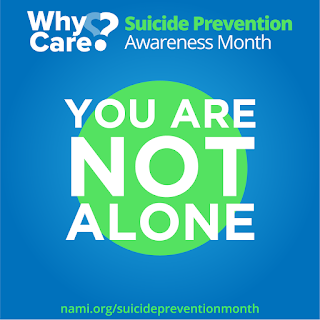With National Recovery Month still underway, we hope that you can also find time to get involved with another vital observance. September is also Suicide Prevention Awareness Month. The annual event is meant to get the word out that mental health conditions and suicidal thoughts are treatable. What’s more, those who seek support can go on to lead healthy lives in recovery.
Suicide is not a subject that is easy to cover because it is so personal. Practically every American is related to or was acquainted with someone who took their own life. When that occurs, there are usually more questions than answers as to why a person would make the fateful decision. Suicide loss survivors are left in the dark following these types of tragedies.
The truth is that each case is different, and the road to suicide is windy. Knowing what was occurring in the mind of a person leading up to their death is impossible. Each person’s struggle and life experience are unique, but there are many similarities from one suicide to the next.
The majority of suicides involve either mental or behavioral health disorders; in some cases, both addiction and co-occurring mental illness are present. The Substance Abuse and Mental Health Services Administration (SAMHSA) reports that suicide is a leading cause of death among people who misuse alcohol and drugs. The heightened risk of suicide owing to substance abuse is second only to depression, according to the Center for Suicide Prevention.
Naturally, people who suffer from mental illnesses like depression, as well as addiction, are at even more significant risk of contemplating and following through with suicide. People living with co-occurring disorders must seek help immediately.
Suicide Prevention Awareness Month
Men and women in recovery and beyond can help the National Alliance on Mental Illness (NAMI) during Suicide Prevention Awareness Month in several ways. Social media is an effective tool for disseminating valuable information to the public and those who have a mental illness. Below are some facts worth sharing:
- 1 in 5 (46.6 million) adults in the United States experience a mental health condition in a given year.
- Approximately 46.6 million adults in the United States face the reality of managing a mental illness every day.
- Up to 90% of those who die by suicide have an underlying mental illness as revealed by a psychological autopsy. 46% of those who die by suicide have a diagnosed mental illness.
- Suicide is the 10th leading cause of death in the United States. With effective care, suicidal thoughts are treatable, and suicide is preventable.
These facts educate the public about mental health and the need for being more compassionate towards people with a mental disease. Compassion combats stigma, which in turn encourages individuals to open up about their issues and seek treatment.
You can help promote awareness by sharing images and graphics on your website and social media accounts—using #SuicidePrevention or #StigmaFree. Sharing the facts about this topic helps start honest conversations about mental health conditions and suicide. NAMI points out that just one conversation can change a life.
Another way to get involved in by recounting your experience with a mental health disorder and suicidal ideations. NAMI invites people living with or recovering from mental illness to share what’s on their mind at You Are Not Alone and OK2Talk. NAMI writes:
“It’s important for people living with mental health conditions to know that they are not alone. Sharing a story about your personal experiences with mental health challenges can help in your own recovery as well as provide encouragement and support to others with similar experiences.”
The platforms allow for anonymous postings about:
- What has helped?
- What hasn’t?
- What has been most discouraging about your condition?
- What has given you hope?
California Dual Diagnosis Treatment
Please contact Hope By The Sea if you are dealing with addiction and co-occurring mental illness. Our clinicians are experts in dual diagnosis treatment, and they can help you begin the journey of long-term recovery. We are available to answer your questions at any time. Hope Starts Here!


